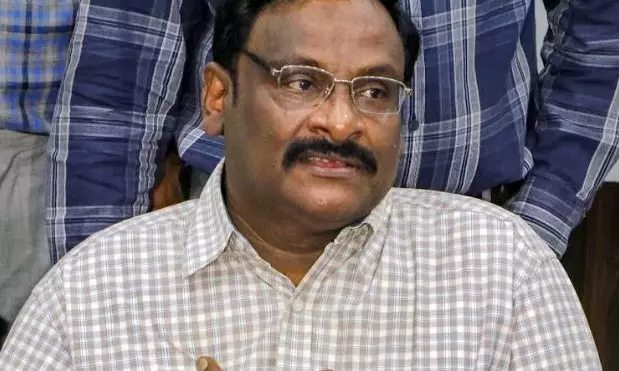Saibaba’s Lifelong Struggle Hits a Full Stop

Hyderabad:Prof. G.N. Saibaba’s lifelong struggle, which began at the age of five when he was crippled by polio, followed by his pursuit of academic excellence despite his physical limitations, and his fight for the rights of the downtrodden, met with a full stop on Sunday.
Hailing from a lower middle class family of farmers from Amalapuram in Andhra Pradesh, he came to Hyderabad and studied MA (English) from the University of Hyderabad. He got his MPhil from English and Foreign Languages University and PhD from Delhi University.
Owing to his humble background, Prof. Saibaba is said to have been attracted towards revolutionary ideology. He was instrumental in starting the All India Peoples Resistance Forum (AIPRF), which was supposed to be an umbrella organisation for all resistance movements in the country.
His colleagues, who participated in various movements with him, recall that he had taken an active part in the pro-reservation movement in the 1990s, to secure rights of those interned in jails, participated in the Telangana statehood movement and took the leadership mantle in several Adivasi rights movements.
On his 10-year incarceration towards the end of his life, they said that the Centre considered a 90 per cent disabled person a threat to the nation because of his intellect. He was, hence, not even granted parole when his mother died.
A bitter critic of the government’s Operation Green Hunt, which sought to neutralise Maoists in five states, Prof. Saibaba’s legal struggles began in 2014, when he was arrested for his links with the proscribed Maoists.
He was released in July 2015 after the Bombay High Court granted bail on medical grounds. He was sent back to jail in December 2015 and was released again in April 2016 after the Supreme Court granted him bail.
A sessions court sentenced him to life imprisonment in March 2017 for his connections with the banned Revolutionary Democratic Front (RDF). Five years later, the Bombay High Court set aside the verdict and acquitted Prof. Saibaba and five others in October 2022, citing the absence of a valid sanction under Unlawful Activities (Prevention) Act (UAPA).
However, a two-judge Supreme Court bench, consisting of Justice Bela Trivedi and Justice M.R. Shah, sat on a Saturday, a court holiday, to hear an appeal filed by the Maharashtra government against the acquittal. The bench found fault with the High Court's order and observed that it had not considered the incriminating material against him as well as the merits of the case.
In March 2024, the Nagpur bench of the Bombay High Court once again acquitted Prof. Saibaba and five others. However, Maharashtra filed for another appeal with the Supreme Court to stay the new HC order.
Recalling his association with him, K. Ravi Chander, co-convenor of Forum Against Repression, said, “I worked with him for 35 years in different organisations. He was part of the Warangal Declaration that raised the need for statehood for Telangana. We formed Jana Sabha for this purpose. The TRS was formed by K. Chandrasekhar Rao after looking at the spirit of this movement. He campaigned against Operation Green Hunt and Salwa Judum.”
Balla Ravindranath, a High Court advocate and general secretary, Committee For The Release of Political Prisoners, recalled that they had worked together for the release of those who were jailed for their political beliefs.

